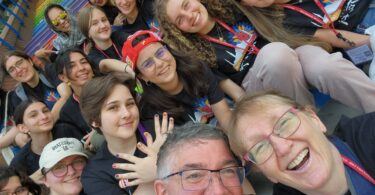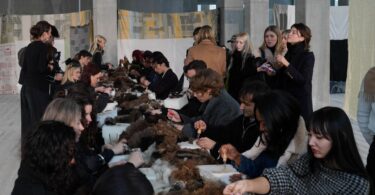Yeouido, Seoul, South Korea – A doctor with roots in both South Korea and America traveled 29 times to North Korea – a place usually out of reach – to fight disease.
“Even though North Korea is not that friendly with South Korea or the United States, we have a common enemy and that is tuberculosis,” said Dr. John Linton, known in South Korea as Ihn Yo-Han (인요한).
Listen to the author read this story:
It all started with his mother, Lois Linton, who moved to South Korea in 1950 with her husband. They sent their children to Korean school in Suncheon.
“Unfortunately, all three of her eldest children got tuberculosis. My mother is not a doctor, but she became very interested in tuberculosis,” said Linton.
In 1996, Linton’s American-born mother was awarded the Hoam Award from Samsung for cultural volunteering and service. She received a large amount of prize money and used it to pay for an ambulance.
Using his mother’s prize money, Linton built the ambulance with help from his friends. The next year, Linton and his mother brought the ambulance to North Korea.
Over time, Linton and his mother went on multiple trips to North Korea. In seven years, they raised about $30 million. They brought vehicles and equipment, including x-ray machines, as well as medicine in 29 trips to North Korea.
Linton, who now holds dual citizenship, viewed the aid to North Korea as something that would help his native South Korea, too.
“At some point North and South Korea will unify,” said Linton, “and it’s best if we could make North Korea more healthy before the unification and infectious disease is a problem for all of us, not just North Koreans.”
Linton, now a member of the South Korean National Assembly, had a career as a medical doctor. He was the director of Yonsei University Hospital.

Life-changing advice
When Linton was young, he witnessed a goat getting bitten by a dog in his hometown. He recalls his family trying to “sew up the goat.”
At that time, Linton and his family were not doctors or veterinarians.
Linton said that an elder – one of his father’s friends from church – came by and said that what happened was sad. Linton, still young, agreed.
The elder then said, “But the plight of humans is even sadder. If you care for injured animals, then shouldn’t you care even more for human beings? They get ill, sick, or have bad accidents. Why don’t you think about becoming a doctor?”
That’s when Linton first thought about the possibility of becoming a doctor.
Journey to become a doctor
To become a doctor in Korea, Linton had to take the Korean doctoral exam – part of which was then in Chinese. Though fluent in Korean, he still had to study the Chinese language for months in order to take the exam.
“So, that was the most difficult thing for me,” said Linton, “Not Korean but reading the Chinese because they didn’t put Korean next to it.” said Linton.
After passing his exams, Linton did his residency in New York. When he returned to Korea in 1991, he began his career as the director of the International Clinic at Yonsei University Severance Hospital.
Granted South Korean citizenship in 2012 because of his contributions to the country, Linton said he has “a great debt to Korea.” South Korea typically does not allow for dual citizenship, but made an exception for Linton, something he considered a gift.

Creating the first Korean ambulance and introducing it to South Korea
During his time as a director, Linton said, he wanted to repay his debt to Korea for becoming a doctor.
When Linton’s father was critically hurt in an automobile accident in 1984, he died in the back of a taxi on the way to the hospital. The tragedy prompted his son to focus on a community need.
“So I worked very hard to make a good ambulance, a Korean-style ambulance,” said Linton.
Linton said his father’s friends donated $40,000, or 32 million in Korean won, toward the project, which was designed to provide an ambulance to the area where the accident had taken place.
The amount “sounds like a lot of money, but to buy an ambulance, we needed more than twice that, like 80 thousand dollars,” said Linton.
Linton’s mother put the money in an account and ordered Linton and his friends to make an ambulance.
So for Linton, “the blessing and the challenge” was that they didn’t have the money to buy an ambulance.
“That was a good thing,” Linton said.
In the end, the final product turned out to be successful.
The first Korean ambulance, created in the Linton family backyard, was made out of a 15-seater Korean minivan.
Once the ambulance was made, Linton told his mother that they should donate it, maybe to the local fire department.
“She was very upset because in her heart she was keeping it as something for my father,” Linton said.
But finally, he convinced her, and Suncheon City accepted the donation.
Linton thought South Korea needed trained people work in the ambulances, so he helped get a program started to train Emergency Medical Technicians (EMTs) and paramedics.

The war and a possible reconciliation
South Korea, with the support and cooperation of the U.S., has grown into a huge economy, Linton said, while North Korea, though rich in natural resources, is very poor.
At some point, North Korea – despite its threats of nuclear bombs and missiles – is going to need to learn from South Korea how to improve healthcare and education, according to Linton.
Linton said that North Korea lacks enough skilled workers. If the two Koreas can get past their ideological differences, they could prosper together.
“Korea will be an even bigger economy and even greater country than it is today,” Linton said.
Unification is the answer, according to Linton.
Linton says that there were a lot of sacrifices in his parents’ and grandparents’ generations during and after the war with North Korea.
It was a big mistake that 3 million Koreans and as many as 70,000 foreign troops died in the war, Linton said, adding that a strong military is important to keep war from happening again.
Still worrisome, he said, are the six million families divided across the border between the two Koreas. Because the war took place 70 years ago, he said, members of those families are slowly dying of old age.
Somehow there must be some reconciliation, Linton said.

The Linton family
Linton’s family has been in South Korea for nearly a century. Eugene Bell, Linton’s great-grandfather, arrived in South Korea in 1895, and their family has been here ever since. The Linton family has always easily embraced South Korean culture since most of them grew up in South Korea from a very young age, and they are all able to speak Korean fluently.
Due to their embrace of the Korean culture, the Linton children who were born in South Korea have Korean names. The most similar Korean last name to Linton, he said, was Ihn, and “요한” is ‘John’ in Korean. So his family name is Ihn and his Korean first name is 요한.
Linton also jokingly said that Suncheon, his Korean hometown, is the center of the universe for him. Years ago, he said, there was radiant heat in Korean homes, warming the floors. He remembered learning a lot of morals and ethics in those homes with with their warm, hot floors, which are called ondols (온돌) in Korean.
“The most important […] two words in my life are humility and restraint,” said Linton.
Message to the younger generation

Young people can go to school because of their parents’ hard work, Linton said, and they must be appreciative and thankful.
He had reassuring words for the younger generation, who can be whatever they want, he said. There are hundreds of thousands of jobs in the world, so youth should not worry if they don’t know what they want to be right away, he said.
“Don’t underestimate yourself. 기 죽지 마라! (Don’t be discouraged!),” said Linton. “Conquer the world, take over the world, be confident, be positive.”
Josephine Lee is a Senior Reporter with Youth Journalism International.



